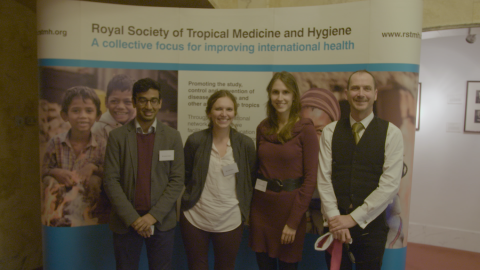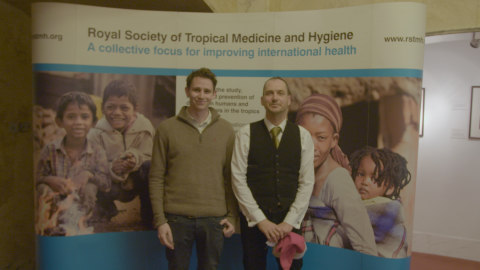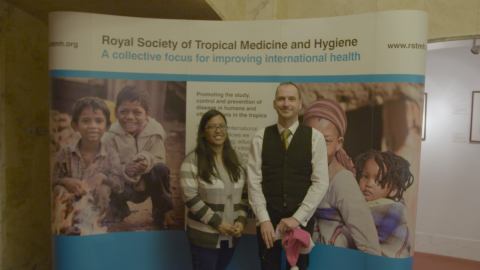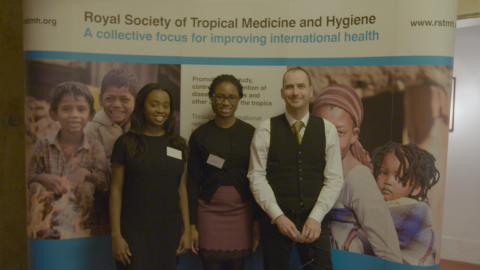Research in progress 2016

Just under 100 people attended our annual Research In Progress meeting, at the end of 2016.
This popular annual meeting is an opportunity to hear from early career researchers directly, about their unpublished research, through presentations or posters. This year we had just under 100 people apply, which is the largest number of applicants since 2012.
We saw an enormous diversity in the research topics put forward, covering many infectious and non-communicable diseases, including schistosomiasis, Chagas disease, soil-transmitted helminthiases, lymphatic filariasis, rabies, sickle cell disease, Lassa fever virus, malaria, cholera, Ebola, sepsis and HIV. We also received research about anaemia, malnutrition, chicken pox, measles, cancer, obesity and domestic burns.
There were a number of applications focused on mental, maternal or migrant health, and co-morbidities featured in a few papers. Resistance to antimicrobials and antimalarials also featured frequently. The research encapsulated stages of the journey from research to impact, including new treatment approaches, processes and programmes, distribution of health workers, evaluation of health responses and the influence of the media on health reporting.
The research was carried out in multiple countries across Africa, Asia, Europe and the USA, and included The Gambia, Malawi, Uganda, Cameroon, Madagascar, Nigeria, Kenya, Sierra Leone, Tanzania, Ethiopia, Rwanda, Ghana, India, Nepal, Myanmar, and the Philippines.
We are delighted to announce the winners and tell you a little about their research in progress.

Suhail Aslam, WorldWide Antimicrobial Resistance Network, showcased research on a review of deaths in antimalarial trials:
“We were looking particularly at quinoline antimalarials as there has been a long-standing concern about them having toxic effects on the heart. But trying to study whether the antimalarials are cardiotoxic in clinical practice can be very tricky, so we were looking at published clinical trials to see if any deaths reported in these might be due to cardiotoxicity. So far, in the deaths reported, we’ve found that deaths which could be linked to cardiotoxicity are extremely rare.”
Julia Dunn, London Centre for Neglected Tropical Disease Research, presented on the topic of soil-transmitted helminth (STH) infections in lower Myanmar:
“With our collaborators at the University of Public Health, Yangon, we conducted an epidemiological investigation into STH infection over the course of a year to determine baseline prevalence and infection intensity, and reinfection after antihelmintic treatment. Preliminary analysis indicates that risk factors associated with repeated STH reinfection include age, household income, household cleanliness and type of toilet.”
Sonja Read, London School of Hygiene & Tropical Medicine, told us about her work testing and gathering feedback about the C-MAMI tool - the community management of uncomplicated acute malnutrition in infants under 6 months:
“This is a handbook translating the WHO guidelines on managing acutely malnourished infants under 6 months into a more operational form. A checklist version of the C-MAMI tool was developed to facilitate its use by health workers in the field. Semi-structured (n=24) and key informant (n=5) interviews were carried out with health workers in Malawi and the original developers of the tool. This study found that a C-MAMI checklist would fill an existing gap and is a viable tool for managing malnourished and at-risk infants, under 6 months, in the community, but well-planned training will be required for the tool to be used effectively.”
Of the poster presentations we had three winners; Joseph Pryce won first prize, Dr Shaheda Anwar was second and Dr Ogaga Sim-Ifere third.
Joseph Pryce, University of Liverpool, told us about expanding the existing self-care training activities to incorporate new disease types:
"The study evaluated the possibility of expanding existing leprosy self-care training groups in south-east Nepal to include lymphatic filariasis (LF) patients. The findings of an LF morbidity mapping survey suggest greater numbers of LF patients in the area than those currently estimated. A questionnaire-based survey of LF and leprosy cases was also conducted, revealing that LF patients had a very poor knowledge of self-care practices and that they rarely accessed health services due to the cost of services and associated travel costs. Although both conditions are highly stigmatised, the majority of LF and leprosy patients stated that they would attend an integrated self-care training group, revealing the potential to provide affordable LF care services in the community."

Dr Anwar, London School of Hygiene & Tropical Medicine, is conducting research for her PhD thesis into the impact of helminth infection on antimycobacterial immune responses in UK migrants:
“The study is investigating if helminth-induced modulation of immune responses is associated with a change in mycobacterial growth inhibition in latent TB patients and in TB/helminth co-infected UK migrants, and also the impact of antihelmintic treatment on antimycobacterial immune responses. Growth inhibition was measured using peripheral blood cell cultures incubated with BCG before addition to a BACTEC MGIT machine. Results show that helminths do modulate the ability to control the growth of BCG, which is improved after anthelmintic treatment.”

Dr Sim-Ifere is researching sepsis:
“This is one of the biggest causes of maternal mortality in Nigeria. Evidence suggests inadequate sepsis management leads to poor clinical outcomes, with mortality increasing by 8% for every hour delay in administering antibiotics. We surveyed 78% of doctors (n=42) at a maternity hospital in Lagos, to assess their sepsis knowledge. We also distributed a leaflet summarising agreed guidelines on sepsis management. A second survey (76% of doctors, n=34) was subsequently carried out. This showed a 10% reduction in the level of confidence regarding their knowledge of sepsis following the leaflet distribution. There was also variation in the definition of sepsis, pre- and post leaflet distribution. The majority of doctors (78%) agreed that national sepsis guidelines in Nigeria are useful. In contrast, 50% believed that sepsis six was useful. Over 95% of doctors would like more training on sepsis management. We suggest that hospitals have robust local guidelines for sepsis, which incorporate evidence-based definitions and management guides for sepsis."
We would like to thank all of our researchers for taking part, once again we were extremely pleased by the diversity of research being carried out and very proud to be able to offer this annual platform to showcase exciting developments in all aspects of tropical medicine and international health research.